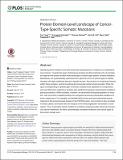| dc.contributor.author | Yang, Fan | en_US |
| dc.contributor.author | Petsalaki, Evangelia | en_US |
| dc.contributor.author | Rolland, Thomas | en_US |
| dc.contributor.author | Hill, David E. | en_US |
| dc.contributor.author | Vidal, Marc | en_US |
| dc.contributor.author | Roth, Frederick P. | en_US |
| dc.date.accessioned | 2015-04-01T15:30:57Z | |
| dc.date.issued | 2015 | en_US |
| dc.identifier.citation | Yang, Fan, Evangelia Petsalaki, Thomas Rolland, David E. Hill, Marc Vidal, and Frederick P. Roth. 2015. “Protein Domain-Level Landscape of Cancer-Type-Specific Somatic Mutations.” PLoS Computational Biology 11 (3): e1004147. doi:10.1371/journal.pcbi.1004147. http://dx.doi.org/10.1371/journal.pcbi.1004147. | en |
| dc.identifier.issn | 1553-734X | en |
| dc.identifier.uri | http://nrs.harvard.edu/urn-3:HUL.InstRepos:14351381 | |
| dc.description.abstract | Identifying driver mutations and their functional consequences is critical to our understanding of cancer. Towards this goal, and because domains are the functional units of a protein, we explored the protein domain-level landscape of cancer-type-specific somatic mutations. Specifically, we systematically examined tumor genomes from 21 cancer types to identify domains with high mutational density in specific tissues, the positions of mutational hotspots within these domains, and the functional and structural context where possible. While hotspots corresponding to specific gain-of-function mutations are expected for oncoproteins, we found that tumor suppressor proteins also exhibit strong biases toward being mutated in particular domains. Within domains, however, we observed the expected patterns of mutation, with recurrently mutated positions for oncogenes and evenly distributed mutations for tumor suppressors. For example, we identified both known and new endometrial cancer hotspots in the tyrosine kinase domain of the FGFR2 protein, one of which is also a hotspot in breast cancer, and found new two hotspots in the Immunoglobulin I-set domain in colon cancer. Thus, to prioritize cancer mutations for further functional studies aimed at more precise cancer treatments, we have systematically correlated mutations and cancer types at the protein domain level. | en |
| dc.language.iso | en_US | en |
| dc.publisher | Public Library of Science | en |
| dc.relation.isversionof | doi:10.1371/journal.pcbi.1004147 | en |
| dc.relation.hasversion | http://www.ncbi.nlm.nih.gov/pmc/articles/PMC4368709/pdf/ | en |
| dash.license | LAA | en_US |
| dc.title | Protein Domain-Level Landscape of Cancer-Type-Specific Somatic Mutations | en |
| dc.type | Journal Article | en_US |
| dc.description.version | Version of Record | en |
| dc.relation.journal | PLoS Computational Biology | en |
| dash.depositing.author | Rolland, Thomas | en_US |
| dc.date.available | 2015-04-01T15:30:57Z | |
| dc.identifier.doi | 10.1371/journal.pcbi.1004147 | * |
| dash.contributor.affiliated | Rolland, Thomas | |


